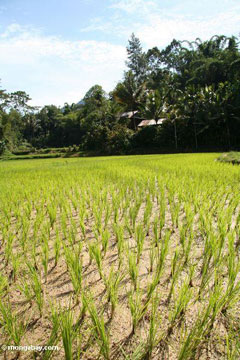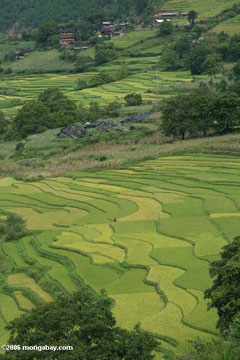Global warming reduced crop yields over past 20 years
Global warming reduced crop yields over past 20 years
Rhett Butler, mongabay.com
March 15, 2007
Global warming has already caused crop losses according to a new study by researchers at the Lawrence Livermore National Laboratory and the Carnegie Institution at Stanford University.
The study, published March 16 in the online journal Environmental Research Letters, shows that warming temperatures have reduced the combined production of wheat, corn, and barley by 40 million metric tons per year between 1981-2002. The authors, David Lobell of Lawrence Livermore and Christopher Field of the Carnegie Institution, estimate the annual losses at $5 billion.
“Most people tend to think of climate change as something that will impact the future,” said Field. “But this study shows that warming over the past two decades has already had real effects on global food supply.”
The authors say the study is the first to estimate the impact of human-caused increases in global temperatures on past global food production.
Comparing yield figures from the Food and Agriculture Organization for the six most widely grown crops in the world — wheat, rice, maize (corn), soybeans, barley and sorghum — with average temperatures and precipitation, the researchers found that yields fell by 3-5 percent for every 1 degree F increase. They said that average global temperatures increased by about 0.7 degrees F during the study period.

|
“What we found is that, over the last several decades, yields of wheat, corn, and barley are consistently lowest in the warmest years.,” Field told mongaby.com.
Lobell and Field say their results show “a clear and simple correlation between temperature increases and crop yields at the global scale” and should spur farmers and policy-makers to begin adapting to climate change.
“We assumed that farmers have not yet adapted to climate change—for example, by selecting new crop varieties to deal with climate change. If they have been adapting—something that is very difficult to measure—then the effects of warming may have been lower,” explained Lobell. “A key moving forward is how well cropping systems can adapt to a warmer world. Investments in this area could potentially save billions of dollars and millions of lives.”
Field says the delay of farmers in taking action may be due to the current debate over global warming.
“Part of the reason that most farmers have not adjusted to changing conditions is that there has been a continuing debate about climate change,” Field explained via email. “If the farmers are waiting for the debate to be settled, they may still be waiting. If it takes several years for farmers to recognize the need to adapt, they will suffer some negative impacts, even when they might have experienced increased yields, if they had adapted promptly.”
The authors note that the six crops they studies account for at least 55 percent of non-meat calories consumed by humans and more than 70 percent of the world’s animal feed.
The study comes a day after a preliminary U.N. report warned that increasing temperatures will have detrimental effects on global agriculture. The report said that the negative impact of higher temperatures will outweigh the possible benefits from higher atmospheric levels of carbon dioxide, which some studies suggest can speed plant growth.
“In many crops, rising carbon dioxide leads to increased plant growth,” added Field via email. “Models that simulate increasing growth in the future typically include a positive effect of CO2 that is larger than the negative effect of warming, at least for warming of 2 degrees or less.”
“Almost all of the models assume that farmers will adjust management, varieties, and locations to adjust to changing conditions. If they do adjust, then it is likely that a little warming will increase yields. Our research suggests they have not been adapting.”
This article quotes from a news release from the Carnegie Institution.
